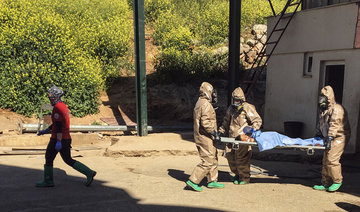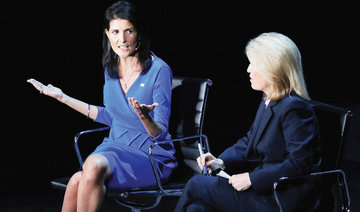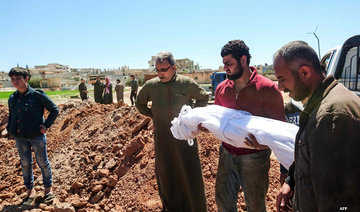WASHINGTON: US President Donald Trump told members of Congress he is “considering military action in Syria,” after a suspected chemical attack that killed at least 83 people.
Trump’s assertion, reported by CNN, came a day after he accused the Syrian regime of gassing its people and pledged that “these heinous actions cannot be tolerated.”
Speaking to reporters aboard Air Force One on Thursday, Trump said that what happened in Syria is “a disgrace to humanity” and “what Assad did is terrible.”
Asked if Assad should go, Trump said: “He’s there, and I guess he’s running things so something should happen.” He said the attack “shouldn’t have happened, and it shouldn’t be allowed to happen.”
While no decision has been made yet, a defense analyst told Arab News that military options could include “US cruise missile strikes against major Syrian Air Force installations.”
Following the chemical weapons attack in Idlib on Monday, CNN reported Thursday that Trump is considering military action in Syria but “had not firmly decided to go ahead with it.”
He is “discussing possible actions with Defense Secretary James Mattis,” it was reported.
Mattis’ role appears to be central as the Pentagon has submitted to the US administration “long-standing options to strike Syria’s chemical weapons capability,” according to CNN.
French Foreign Minister Jean-Marc Ayrault said Thursday that “a day will come when international justice will give its verdict on (Syrian President) Bashar Assad who is massacring his people.”
Speaking to news channel CNEWS, he added: “These crimes must not go unpunished. In any case, there are investigations, United Nations commissions... there will be a war crimes trial.
“It’s difficult because up to now every time we have presented a resolution, there has been a veto by Russia and sometimes by China ... but we must cooperate because we need to stop this massacre.”
German Chancellor Angela Merkel said it was a scandal that the UN Security Council did not pass a resolution condemning the suspected chemical attack in Syria this week.
“It was a barbaric attack that must be cleared up. The use of chemical weapons is a war crime,” Merkel told a news conference in eastern Germany, adding there were some indications it was carried out by Assad’s forces.
“It is a scandal that no UN Security Council resolution materialized and those who opposed it must consider what responsibility they bear,” she said.
Tobias Schneider, a defense analyst based in Berlin and a close watcher of the Syrian conflict, told Arab News that “as of now, there appears to be no coherent position coming from the White House.”
He added: “If Trump is indeed willing to push aside institutional skepticism about intervention against Assad, he will be looking for military options that are both sufficiently symbolic and punitive.”
Such options could include, according to Schneider, “cruise missile strikes against major Syrian Air Force installations,” but could “obviously risk ... accidentally hitting Russian troops.”
Schneider also cautioned that “after the dust settles, Assad could repair the damaged runways and claim for himself to have survived an onslaught by the mightiest military in the world, hence taunting the US to either lose face or escalate further — a dangerous prospect with a President Trump.”
Also on Thursday, President Vladimir Putin’s spokesman said Russia’s support for Assad is not unconditional, but that the country demands a full investigation of the suspected chemical attack on an opposition-held province in Syria before the UN takes any action.
Dmitry Peskov told The Associated Press that “unconditional support is not possible in this current world,” but added that “it is not correct to say that Moscow can convince Mr. Assad to do whatever is wanted in Moscow. This is totally wrong.”
France warned Russia it would face a “terrible responsibility in front of history” if it decides to veto a draft UN resolution demanding an investigation of the suspected chemical attack in Syria.
Negotiations were continuing on the proposed measure presented by France, Britain and the US, but chances for a compromise with Russia appeared dim.
tions in good faith to adopt a resolution,” French Ambassador Francois Delattre told reporters in New York. “But make no mistake about it: We need a robust text,” he said.
Asked about the threat of a Russian veto of the measure, Delattre indicated that Russia would be harshly judged by history. “That would be a terrible responsibility in front of history,” he said.
British Foreign Minister Boris Johnson said he cannot understand how anyone on the UN Security Council could fail to sign up to a resolution condemning the attack.
Johnson said on Thursday during a visit to Sarajevo that he “cannot understand how anybody on the UN Security Council could fail to sign up to a motion condemning the actions of the (Assad) regime that is almost certainly responsible for that crime.”
Johnson described the attack in Idlib as “abominable and contemptible” and said “those who did it deserve international condemnation.”
In Turkey, President Recep Tayyip Erdogan has said he hopes Trump will take military action in Syria after this week’s attack.
Turkey’s state-run Anadolu Agency quoted Erdogan as reacting to news reports Thursday that Trump was mulling military action after the assault in the northern Syrian town of Khan Sheikhun.
It quoted Erdogan as saying Turkey would be prepared to do “whatever falls on us” to support possible military action. Turkey is a leading supporter of the opposition fighting to overthrow Assad.
Earlier, Turkish officials said that autopsies of the victims from the assault, which happened 60 miles (95 kilometers) from the Turkish border, show they were subjected to chemical weapons.
Meanwhile, two US military officials told NBC News that Syrian fixed-wing aircraft dropped suspected chemical weapons on civilians in Idlib earlier this week in a deadly attack which killed at least 83 people — including 25 children — and injured at least 350 others.
The US military saw the aircraft on a radar and watched them drop the bombs, the officials said. The radar soon picked up the flashes and booms in the opposition-held area of Syria.
The bombs hit a hospital run by the Al-Qaeda-linked Al-Nusra Front damaging operating rooms and injuring medical professionals, the officials said.
Soon after, civilians on the ground began responding in a way that is consistent with exposure to a nerve agent documented in horrific images of people writhing in pain, coughing and young children gasping for air.
One official said he believes there was a combination of two agents and while he does not believe one was chlorine, he would not say what they were.
“What Assad did is terrible,” says Trump as he mulls Syrian military intervention
“What Assad did is terrible,” says Trump as he mulls Syrian military intervention

Qatar says sanctions on Syria must be lifted quickly

“We call for intensified efforts to expedite the lifting of international sanctions on Syria,” foreign ministry spokesperson Majed Al-Ansari told a regular briefing.
Qatar’s call came a day after a high-level delegation visited Damascus. The Qatari embassy there reopened on Sunday, ending a 13-year rift between the two countries.
“Qatar’s position is clear,” Ansari said. “It’s necessary to lift the sanctions quickly, given that what led to these sanctions is no longer there and that what led to these sanctions were the crimes of the former regime.”
Doha was one of the main backers of the armed rebellion that erupted after Assad’s government crushed a peaceful uprising in 2011.
Unlike several of its neighbors, Qatar had remained a stern critic of Assad and did not renew ties with Syria despite its return to the Arab diplomatic fold last year.
The international community has not rushed to lift sanctions on Syria, waiting to see how the new authorities exercise their power.
Israeli forces kill one Palestinian in West Bank refugee camp

- Palestinian news agency WAFA said Fathi Saeed Odeh Salem died after snipers shot him and fired on the ambulance crew
JERUSALEM: Israeli forces killed a Palestinian man in a dawn raid on Tuesday on a refugee camp near the city of Tulkarm in the Israeli-occupied West Bank, Palestinian and Israeli officials said.
The Israeli military said the man was killed in a “counter-terrorism” operation that resulted in 18 arrests, while the official Palestinian news agency WAFA said Fathi Saeed Odeh Salem died after snipers shot him and fired on ambulance crew.
Hundreds of Palestinians and dozens of Israelis have been killed in the West Bank since the Oct. 7, 2023 attack by Hamas militants on southern Israel triggered the current war in Gaza and a wider conflict on several fronts.
WAFA said Israeli bulldozers demolished infrastructure in the camp, including homes, shops, part of the walls of Al-Salam mosque, which they barricaded off, and part of the camp’s water network.
Israeli army forces patients out of a north Gaza hospital

CAIRO: Israeli troops forced the evacuation of the Indonesian Hospital in northern Gaza and many patients, some of them on foot, arrived at another hospital miles away in Gaza City, the territory’s health ministry said on Tuesday.
The Indonesian Hospital is one of the Gaza Strip’s few still partially functioning hospitals, on its northern edge, an area that has been under intense Israeli military pressure for nearly three months.
Israel says its operation around the three northern Gaza communities surrounding the hospital — Beit Lahiya, Beit Hanoun and Jabalia — is targeting Hamas militants.
Palestinians accuse Israel of seeking to permanently depopulate northern Gaza to create a buffer zone, which Israel denies.
Munir Al-Bursh, director of the health ministry in the Hamas-run Gaza Strip, said the Israeli army had ordered hospital officials to evacuate it on Monday, before storming it in the early hours of Tuesday and forcing those inside to leave.
He said two other medical facilities in northern Gaza, Al-Awda and Kamal Adwan Hospitals, were also subject to frequent assaults by Israeli troops operating in the area.
“Occupation forces have taken the three hospitals out of medical service because of the repeated attacks that undermined them and destroyed parts of them,” Bursh said in a statement.
The Israeli military said it was looking into the report.
Officials at the three hospitals have so far refused orders by Israel to evacuate their facilities or leave patients unattended since the new military offensive began on Oct. 5.
Israel says it has been facilitating the delivery of medical supplies, fuel and the transfer of patients to other hospitals in the enclave during that period in collaboration with international agencies such as the World Health Organization.
Hussam Abu Safiya, director of the Kamal Adwan Hospital, said they resisted a new order by the army to evacuate hundreds of patients, their companions and staff, adding that the hospital has been under constant Israeli fire that damaged generators, oxygen pumps and parts of the building.
Israeli forces have operated in the vicinity of the hospital since Monday, medics said.
NEW STRIKES
Meanwhile, Israeli bombardment continued elsewhere in the enclave and medics said at least nine Palestinians, including a member of the civil emergency service, were killed in four separate military strikes across the enclave on Tuesday.
The war in Gaza was triggered by Hamas’ Oct. 7, 2023 attack on southern Israel, in which 1,200 people were killed and 251 taken hostage to Gaza, according to Israeli tallies.
Israel’s campaign against Hamas has since killed more than 45,200 Palestinians, according to health officials in the Hamas-run enclave. Most of the population of 2.3 million has been displaced and much of Gaza is in ruins.
A fresh bid by mediators Egypt, Qatar and the United States to end the fighting and release Israeli and foreign hostages has gained momentum this month, though no breakthrough has yet been reported.
Israeli Prime Minister Benjamin Netanyahu on Monday said progress had been made in hostage negotiations with Hamas but that he did not know how much longer it would take to see the results.
Gaps between Israel and Hamas over a possible Gaza ceasefire have narrowed, according to Israeli and Palestinian officials’ remarks on Monday, though crucial differences have yet to be resolved.
Syrian ex-rebel factions agree to merge under defense ministry

DAMASCUS: Syria’s de facto leader Ahmed Al-Sharaa reached an agreement on Tuesday with former rebel faction chiefs to dissolve all groups and consolidate them under the defense ministry, according to a statement from the new administration.
Prime Minister Mohammed Al-Bashir had said last week that the ministry would be restructured using former rebel factions and officers who defected from Bashar Assad’s army.
Sharaa will face the daunting task of trying to avoid clashes between the myriad groups.
The country’s new rulers appointed Murhaf Abu Qasra, a leading figure in the insurgency that toppled Bashar Assad, as defense minister in the interim government.
Syria’s historic ethnic and religious minorities include Muslim Kurds and Shiites — who feared during the civil war that any future Sunni Islamist rule would imperil their way of life — as well as Syriac, Greek and Armenian Orthodox Christians, and the Druze community.
Sharaa has told Western officials visiting him that the Islamist Hayat Tahrir Al-Sham (HTS) group he heads, a former Al-Qaeda affiliate, will neither seek revenge against the former regime nor repress any religious minority.
Syrian rebels seized control of Damascus on Dec. 8, forcing Assad to flee after more than 13 years of civil war and ending his family’s decades-long rule.
Israel PM vows to fight ‘forces of evil’ in message to Christians

JERUSALEM: Israeli Prime Minister Benjamin Netanyahu on Tuesday acknowledged what he described as the steadfast support of Christians worldwide for Israel’s fight against the “forces of evil.”
Christians in Israel and the Palestinian territories were preparing for a somber wartime Christmas for the second consecutive year, with the ongoing war in the Gaza Strip casting a shadow over the season.
“You’ve stood by our side resiliently, consistently, forcefully as Israel defends our civilization against barbarism,” Netanyahu said in a video message to Christians across the world.
“We seek peace with all those who wish peace with us, but we will do whatever is necessary to defend the one and only Jewish state, the repository and the source of our common heritage.
“Israel leads the world in fighting the forces of evil and tyranny, but our battle is not yet over. With your support, and with God’s help, I assure you, we shall prevail,” Netanyahu said.
The war in Gaza, which erupted on October 7, 2023 following a deadly Hamas attack on Israel, has significantly impacted the Christian communities in Israel and the Palestinian territories.
Israel’s subsequent military campaign in Gaza has killed at least 45,317 people, a majority of them civilians, according to the health ministry in the Hamas-run territory. The figures are considered reliable by the United Nations.
Israel is home to approximately 185,000 Christians, accounting for about 1.9 percent of the population, with Arab Christians comprising nearly 76 percent of the community, according to data from the country’s Central Bureau of Statistics.
According to Palestinian officials, about 47,000 Christians reside in the Palestinian territories, including the Gaza Strip.












